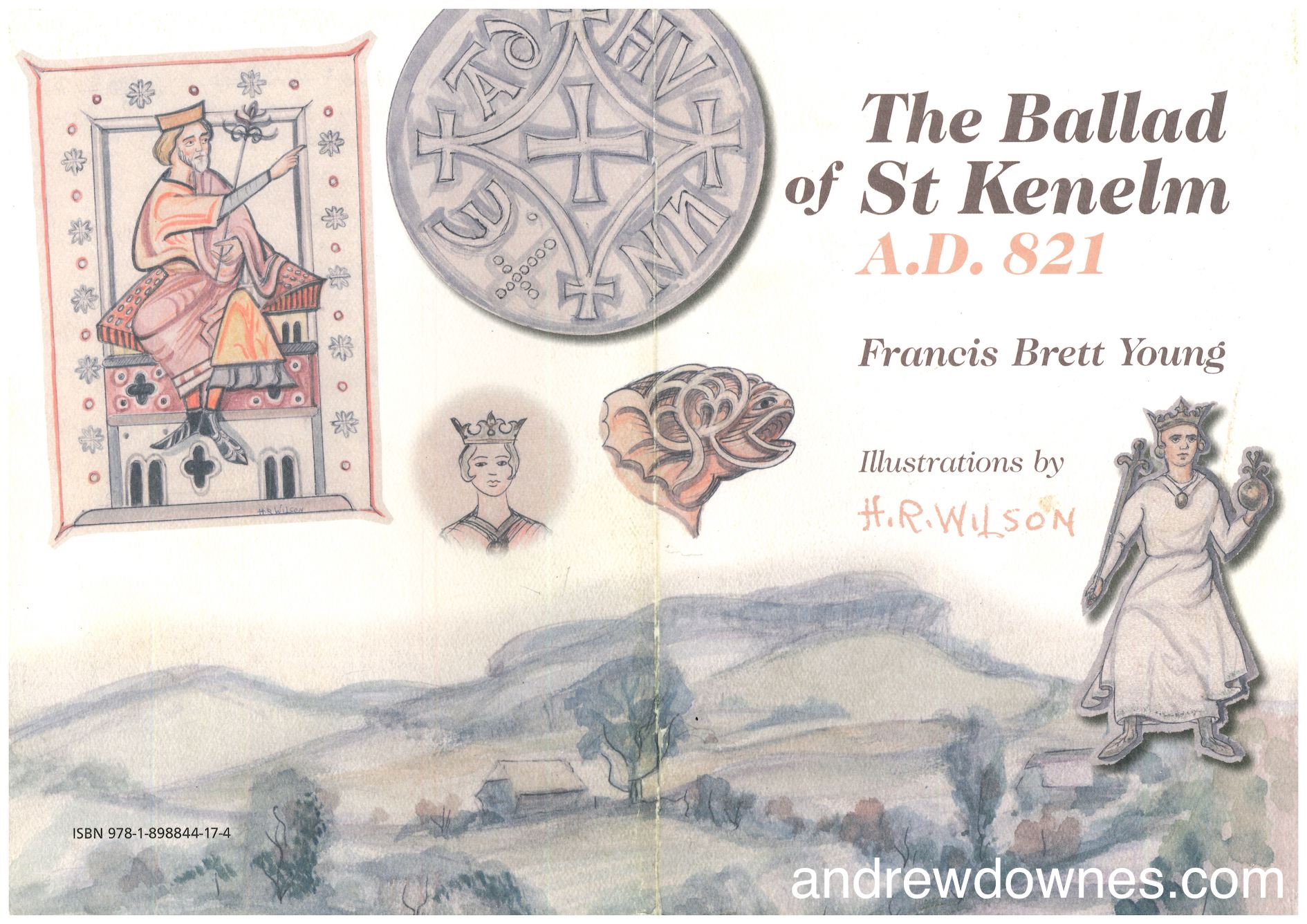Back to andrewdownes.com

Music Education
Resources by Paula Downes, a lot of music by Andrew Downes
The Ballad of St Kenelm
Book cover of The Ballad of St Kenelm with illustration by H.R.Wilson
On this page:
- Introductory Video: the legend
- The Poem by Francis Brett Young
- The Poet
- Musical Setting by Andrew Downes (for Narrator, Soprano Soloist, Actors and Chamber Orchestra) - watch video
- Activities
Introductory Video
Francis Brett Young's Poem
The poem by Frances Brett Young tells the story of the 7 year old King Kenelm who was murdered in a jealous plot by his sister. Pilgrims flocked to the chantry built at the brook where Kenelm was slain, and were healed by the waters. Thus Kenelm was beatified.
THE BALLAD OF ST. KENELM AD 821
By Francis Brett Young (1884-1954)
In our sweet shires of Mercia
Five blessed Saints we had;
Four were proud Princes of the Church,
And one was a little lad.
Wistan, Wulstan, Oswald, Chad:
Each hallowed Mercia's realm;
But the saint we love all others above
Is little Saint Kenelm.
Kenelm was but a child of seven
And his father seven weeks dead,
When in Lichfield town they set the crown,
Of kingship on his head,
And hailed him as their anointed king,
While all the Mercian lords
Took oath to stand at Kenelm's hand
On the cross-hilts of their swords;
And the bronze bells of Lichfield clanged
And rocked their towers of stone,
That God had sent an innocent
To sit on Offa's throne;
While folk that laboured in the fields
Heard the bells clang with joy,
And thronged the ways to cheer and gaze
On the beauty of the boy.
But his sister Quendryth in her bower
Brooding stayed apart;
Alone she sate, with naught but hate !
And black gall in her heart,
And a sour face thrawn with bitterness
That this weak child should own
The shining prize for which her eyes
Most lusted: Mercia's crown.
So sent she for her paramour-
Lord Escebert was his name-
And whispered near his willing ear
These words of dark shame:
"We twain are one in will and flesh,
And but for one small thing
I should have been thy crowned queen
And thou my wedded king;
"And that small thing is but the breath
Of my father's brat, Kenelm.
Give me his life, and wed me wife,
And we will share this realm!"
Then Escebert, her paramour,
Pondered Quendrytha's rede,
And searched his mind some way to find
To compass that dark deed.
And as it chanced, that very month,
The Lords of Mercia went
To hunt the wolf in Offa's Wood
That shags the hills of Clent:
A deep wood and a dark wood,
For black deeds meet, where grew
A brambled brash of oak and ash,
Hazel and holly and yew.
And when into the wood's green heart
He saw the hunters ride,
Then Escebert slipped behind, and clipped
Himself to Kenelm's side.
"Good Escebert, they ride too fast:
Forsake me not, I pray,
When through the thorns the wail of horns
Shivers and dies away!"
"Let them ride on, my little king:
No matter how far they go,
You need have no fear of wolf or bear
With me at your saddle-bow."
"Good Escebert, a thorn has hurt
My pony's hoof, I fear:
The dusk now broods on these wild woods
And the black of night draws near."
"Content thyself, my little king,
Nor dread the fading light:
Full well I wot of a woodward's cot
Where we may bide this night."
"Good Escebert, I am athirst,
And my tongue cleaves to my mouth."
"I know of a spring, my little king,
To slake and quench thy drouth."
But when they came to a woodland brook,
And the child, unaware,
Knelt by the brink and bent to drink,
A sword flashed in the air;
And the shorn head of little Kenelm
Reddened the brook with blood,
While Escebert leapt to his saddle and crept
Like a wolf from Offa's Wood.
Loose-reined he rode through the dark night
Till he came to the hall of a thane
Where the huntsmen rolled with ale and told
Of the fierce wolves they had slain.
Ho, Escebert, good lord," they cried,
"Come join out wassailing!
For you have missed our drinking-tryst
To ride with the little king."
Then Escebert's false cheek grew wan:
"God witness what I say!
I have not seen Kenelm, I ween,
Since noon of yesterday,
"Nor can I guess what ways he strayed:
So quit your wassail-board,
That all may search oak ash and birch
To find our little lord!"
A weary week those woods they searched
By holt and holm and glade;
But neither eve nor foot drew nigh
The place where he was laid;
And never a single whisper woke
Those brambly solitudes
But the rustle that spreads from the wind-stirred heads
Of wild trees in the woods.
(Hazel, hazel, bend your boughs
Over the streamlet's bed,
And with your primrose pollen gild
A halo for his head!
Holly, holly, shake your branch
Till the brittle leaves rain down,
And weave about the dead child's brow
A martyr's thorny crown!
Cherry, cherry, shed your snow
Of petals in a cloud,
And on the little limbs below
Spread a soft shroud!
Yew tree, yew tree, over him
Your funeral pennons wave;
But let not your bright berries drip
Their blood upon his grave,
To fleck the whiteness of the shroud
That the wild cherry strewed
On the gentlest fawn that ever was torn
By wolf in Offa's Wood!)
So home the hunt to Lichfield rode
And the bronze bells clanged again
A muffled toll for the innocent soul
Of the child that had been slain;
And folk who heard the tolling wept,
For they knew what it must mean;
And the Mercian Lords swore on their swords
To hold Quendrytha queen.
Now far away in Italy,
Under Peter's dome,
Frail and old on his throne of gold
Slept Paschal, Pope of Rome.
A weary man, an aged man
Of four score years and seven;
And in his listless hands he held
The Crossed Keys of Heaven.
Holy Holy, Holy!
The children's voices swell,
While sweet and loud, through the incense-cloud
Shivers the Sanctus Bell;
And as they heard the silvery chime,
From the clouded vault above
Like a falling flake of cherry-bloom
Fluttered a milk-white dove
That held a quill in his golden bill
And laid it on the Host,
And all the people rose and cried:
"See, see: the Holy Ghost!"
"A miracle ... A miracle!"
So loud a cry there broke
That the old Pope rubbed his rheumy eyes
And dropt his keys, and woke!
And he called three scarlet cardinals
To read out what was writ
On the parchment folded within the quill,
But they could not fathom it.
"These -words are writ in rhyme," they said,
And the tongue of a far land
That none in Rome or Christendom
Is like to understand.
"Yet all strange peoples come to Rome,
So let the rhyme be heard;
Some ear may catch the sound and match
The sense to fit the word":
In Clent cowbethe Kenelm Kynebear lfth
Under thorne haevedes bereaft.
Then up spoke an old Saxon clerk:
"Sirs, you have given news
Of the bloodiest deed that ever was done
Since Christ was slain by the Jews:
"That in Cowbeath, which is by Clent,
Midmost in Mercia's realm,
Beneath a thorn, his head off shorn,
Lieth our king, Kenelm."
So the Pope blessed that screed,
and with The ring of Peter sealed,
And bade that Saxon carry it
To his Bishop, in Lichfield.
Then, once again, from Lichfield towers,
The bells boomed overhead;
And the Mercian thanes rode out again
To search for Kenelm's head;
And when they came to the woods of Clent
And rode into the shade,
Behold-a shaft of blinding light
Fell where the child was laid!
So, tenderly, they lifted him
And bore him to his tomb
In Winchcombe, where our Mercian kings
Lie till the Day of Doom;
But as through Winchcombe's mourning street
They passed by slow degrees,
Quendrytha at her window sate
With the Bible on her knees.
She read of false Queen Jezebel,
And when they spied the hearse
That carried Kenelm, her wicked eyes
Spat blood upon the verse.
And the common folk, who saw this thing,
Knew what it meant full well,
And flung her down into the street
To lie like Jezebel;
And Escebert, her foul paramour,
They slew him where he stood;
And those twain lay for a week and a day,
And the dogs lapped their blood.
But the king's lords buried little Kenelm
With pomp in Winchcombe's fane,
And built a chantry for pilgrim-folk
By the brook where he was slain;
And the waters that well from where he fell
All mortal ills assuage
Not even Saint Thomas of Canterbury
Hath greater pilgrimage
Than the innocent king of Mercia
That his sister's leman slew
And hid in the brash of oak and ash,
hazel and holly and yew!
Wistan, Wulstan, Oswald, Chad:
All pray for Mercia's realm;
But our loveliest saint was a little lad:
King Kynewulf's son, Kenelm.
From The Island by F Brett Young, 1944, Heinemann.
The Poet, Francis Brett Young
Watch this video about the life and works of Black Country poet, Francis Brett Young:
Musical Setting
Watch this setting by Andrew Downes for solo soprano voice, narrator, actors and instrumental ensemble (flute/piccolo, oboe, bassoon, trumpet, percussion, 4 violins, 2 violas, 2 cellos, double bass):
Purchase the downloadable sheet music and learn more about the work
Learn about the composer Andrew Downes
Activities
- Go on the beautiful walk, St. Kenelm's Trail, to see the places in the poem.
- Learn about the poet on the website of the Francis Brett Young Society
- Read about Saint Kenelm on Wikipedia

Music Education
Resources by Paula Downes, a lot of music by Andrew Downes
Back to andrewdownes.com
Follow Cynthia Downes on Instagram to keep up-to-date with her blog posts.
If you have performed in any of Andrew Downes' works or come to listen, please share your experiences in the Premieres Blog! Also see what others have said. Thank you so much for your contribution.



